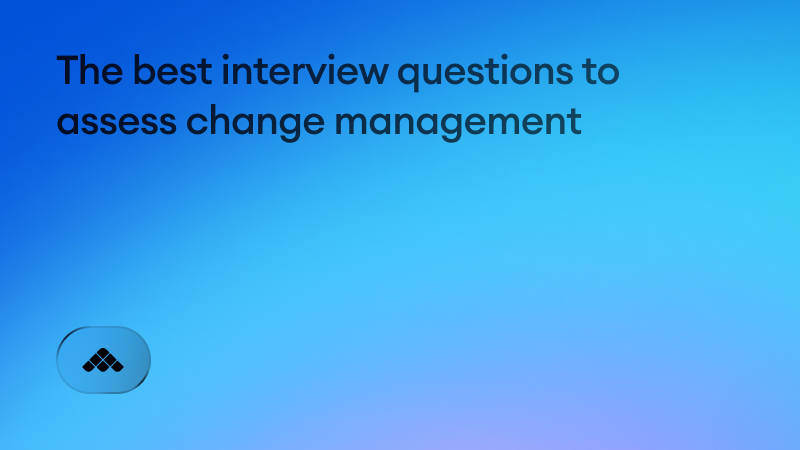Nowadays, the ability to manage change effectively is crucial for organizational success. Change management professionals play a pivotal role in guiding organizations through transitions, ensuring minimal disruption and fostering a culture of adaptability.
When hiring for roles that require strong change management skills, it is essential to assess candidates thoroughly to determine their capability to lead and manage change initiatives.
This article provides a comprehensive list of interview questions tailored to evaluate change management competencies, along with insights on what to look for in responses and tips for an effective hiring process.
What is change management?
Change management is the ability to guide teams, processes, or organizations through transitions—whether that’s adopting new tools, restructuring teams, shifting strategies, or evolving ways of working.
Strong change managers anticipate resistance, communicate clearly, and help people adapt without losing momentum. It’s a blend of strategy, empathy, communication, and execution that ensures change actually sticks rather than causing disruption or confusion.
Why is change management experience important to assess?
Because change is constant, and teams need people who can navigate ambiguity instead of getting derailed by it. Candidates with strong change management skills can keep stakeholders aligned, maintain team morale, and move projects forward even when direction shifts.
These individuals spot risks early, bring clarity to messy situations, and create stability during times of transition.
Hiring people who can manage change well reduces friction, improves adoption of new initiatives, and protects business continuity.
Which roles does this skill impact most?
Change management is crucial for leadership roles—managers, directors, and executives—because they’re responsible for guiding teams through evolving priorities. It’s equally essential for project managers, product managers, and operations professionals who regularly implement new workflows, tools, or processes.
Customer-facing roles also rely on it, especially when products or policies shift and they must help customers adapt.
Even in individual contributor roles, especially in fast-moving companies, the ability to embrace and drive change often separates high performers from everyone else.
Change management interview questions
- Can you describe a time when you led a significant change initiative in your organization?
- How do you approach resistance to change from team members or stakeholders?
- What strategies do you use to communicate change effectively within an organization?
- How do you measure the success of a change management project?
- Can you provide an example of how you aligned a change initiative with the company’s strategic goals?
- How do you ensure that changes are sustainable in the long term?
- Describe a situation where a change initiative did not go as planned. How did you handle it?
- What role does leadership play in successful change management, and how do you engage leaders in the process?
- How do you assess the readiness of an organization for change?
- What tools or methodologies do you prefer for managing change, and why?
What to look for in interviews
- Practical experience: Look for candidates who can provide specific examples of past change initiatives they have led or been involved in, demonstrating hands-on experience.
- Problem-solving skills: Assess how candidates handle challenges and resistance, indicating their ability to navigate obstacles effectively.
- Communication abilities: Effective communication is critical in Change Management. Candidates should showcase their strategies for clear and transparent communication.
- Strategic alignment: Ensure that candidates understand how to align change initiatives with broader organizational goals and strategies.
- Measurement and evaluation: Candidates should demonstrate the ability to set metrics and evaluate the success of change projects objectively.
- Adaptability and resilience: Look for examples that highlight the candidate’s ability to adapt to unforeseen changes and maintain resilience in the face of setbacks.
- Leadership engagement: Strong Change Managers engage leadership effectively. Look for evidence of how candidates have involved leaders in past initiatives.
- Sustainability focus: Candidates should emphasize the importance of making changes sustainable, not just implementing them temporarily.
- Tool proficiency: Familiarity with Change Management tools and methodologies indicates a candidate’s preparedness and technical proficiency in the field.
Tips to evaluate change management during hiring
Evaluating change management skills requires more than a few surface-level questions. The goal is to reveal a candidate's instincts and strategies in moments of uncertainty, and not just their polished talking points.
Use the tips below to get a clear, well-rounded view of how effectively a candidate can guide teams through change.
Use behavioral interview techniques
Behavioral questions give candidates the chance to ground their answers in real experiences instead of theory. By asking them to walk through specific change initiatives they’ve led or contributed to, you gain a clearer picture of how they operate under uncertainty.
These stories reveal their approach to planning, communication, resistance, and follow-through. You’ll also see whether their instincts align with how your organization handles change.
Assess cultural fit
Every company has its own rhythm for change—some move fast and break things, while others emphasize alignment and careful rollout. Evaluate whether the candidate’s natural approach matches your culture’s expectations.
Even highly skilled change leaders can struggle if their style conflicts with how your teams collaborate or make decisions. Look for candidates who can reinforce your culture, not fight against it.
Involve key stakeholders
Change doesn’t happen in a vacuum, and neither should your hiring decision. Bringing in team members or cross-functional partners who will work closely with the new hire gives you a fuller picture of how the candidate operates.
Stakeholders can assess nuances like collaboration style, influence skills, and adaptability in real conversation. This also builds early trust and alignment around the hire.
Scenario-based questions
Hypothetical scenarios help reveal how candidates think when they don’t have the luxury of choosing a perfectly polished example. Present a change situation that mirrors your organization's current challenges and ask how they'd navigate it.
You’ll see how they assess risks, communicate a plan, and handle resistance. These scenarios showcase real-time thinking and strategic instincts.
Evaluate communication skills
Change management without strong communication quickly collapses. Pay close attention to how candidates explain their approach—are they clear, structured, and thoughtful? The way they articulate change to you often mirrors how they’ll communicate with stakeholders under pressure.
Strong change leaders can simplify complexity and bring people along with confidence.
Check references
References checks are invaluable for confirming how a candidate actually performed during past periods of change. Ask about the size and complexity of change initiatives they handled, how they managed resistance, and what impact they had on team morale.
You may uncover strengths the candidate didn’t highlight—or weaknesses they avoided mentioning. This step helps validate your interview insights with real-world evidence.
Look for continuous learning
Change management practices evolve constantly, and the best candidates stay curious and up to date. Ask which frameworks, methodologies, or tools they use and how they’ve adapted their approach over time.
Candidates who invest in continuous learning signal maturity, self-awareness, and a commitment to improvement. These are the people who can evolve alongside your organization’s needs.
Assess emotional intelligence
Change often stirs uncertainty, fear, and resistance, so emotional intelligence is essential. Listen for empathy, self-awareness, and the ability to understand others’ perspectives in their answers.
Strong candidates stay level-headed, show respect for different viewpoints, and intentionally build trust during transitions. EQ is often what separates merely competent change leaders from truly exceptional ones.
In summary
Effective change management is vital for organizations striving to stay competitive and resilient in a dynamic environment. By asking the right interview questions, understanding what to look for in candidate responses, and using evaluation techniques, employers can identify professionals who possess the necessary skills and mindset to lead successful change initiatives.
Investing time in a thorough hiring process ensures that the selected candidates will not only manage change effectively but also contribute to fostering a culture of continuous improvement and adaptability within the organization.



